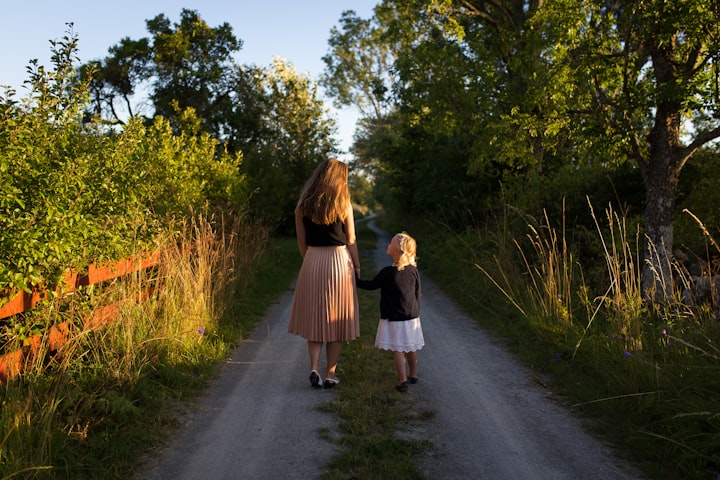
It occurred to me that I had given my mother a hard time when I always ran to the ground alone.

She is not the kind of mother who just loves her son but does not understand him. She knew that I was upset, that I should not be prevented from going out, and that I would be worse off if I stayed at home, but she was worried about what I would think about all day in that deserted garden alone. I was so bad-tempered that I often left home in a frenzy and came back from the garden without saying anything like I was possessed. My mother knew that there were some things that she should not ask, so she hesitated to ask, but finally did not dare to ask, because she did not have the answer in her mind. She expected that I would not want her to go with me, so she never asked for this, she knew she had to give me some time alone, there had to be such a process. She just didn't know how long it would take, and what the end of the process would be. Every time I had to leave, she would wordlessly help me get ready, help me get into the wheelchair, and watch me turn out of the courtyard, and then what she would do after that, I never thought about back then.
One time when I was out of the courtyard, I remembered something and came back to see my mother still standing in the same position as when she sent me away, looking at the corner where I had turned out of the courtyard, not reacting to my return for a while. When she sent me out again, she said, ''Go out and do some activities, go to the ground and read a book, I said it was good.'' It was only many years later that I gradually realized that my mother's words were self-congratulatory, a secret prayer, a hint to me, a plea, and a command. It was only after her sudden death that I had time to envision it. During those long hours when I was not at home, she was restless and restless, in pain and terror and the least of a mother's prayers. I can conclude that, with her wisdom and fortitude, in the night after those empty days, in the day after those sleepless nights, she must have thought and said to herself: ''I can't keep him out anyway, the future is his own, and if anything should happen to him in that garden, I will have to bear the suffering.'' In those days - and they were years long - I think I must have prepared my mother for the worst, but she never said to me, ''Think of me.''
I didn't think about her either. Her son, then, was too young to think of his mother, too dazed by fate to think that he was the most unfortunate one in the world, not knowing that a son's misfortune is always doubled by his mother. She had a son who suddenly became paraplegic at the age of twenty, her only son. She wished she had been the one to suffer the paraplegia instead of her son, but there was no substitute for it. She thought, as long as her son could live, even if she had to die, she was sure that a person could not just live, her son had to have a path to his happiness. And this path, no one can guarantee that her son will finally find it. --Such a mother is destined to be the one who lives the most miserable life.
I once talked with a writer friend and asked him what his initial motivation for learning to write was. He thought for a moment and said, ''For my mother. To make her proud.'' I was shocked and speechless for a long time. When I think back to my initial motivation for writing novels, although it was not as simple as this friend's, I also had the same desire as he did, and after thinking about it, I found that this desire also accounted for a large part of the total motivation. This friend said, ''My motive is too vulgar, isn't it?'' I just shook my head, thinking that vulgarity does not necessarily mean vulgarity, but only that this wish is too naive. He added: ''I just wanted to be famous at that time, to be famous so that others would envy my mother.'' I think he was franker than I was. I think, again, he is happier than me because his mother is still alive. And I think that his mother was also luckier than mine in that his mother did not have a son with two crippled legs, otherwise, things would not be so simple.
When my first novel was published, in those days when my novel won its first prize, how I wished my mother was still alive. I couldn't stay at home again, and I ran to the earth altar all day long, alone, with no end of gloom and sorrow in my heart, walking all over the garden but I couldn't figure out: Why couldn't my mother live two more years? Why is her son about to open a road, she suddenly can not survive. Could it be that she came to this world only to worry about her son, but should not share a little of my happiness? She was only forty-nine when she left me in a hurry! For a while, I was even filled with hatred and disgust for the world and God. Later I wrote in an essay entitled ''The Acacia Tree'': ''I sat in the quiet woods of the small park, closed my eyes, and wondered why God had called my mother back so early. For a long, long time, in a daze, I heard the answer: 'She was too bitter in her heart, and God saw that she could not bear it any longer, so he called her back.' I opened my eyes and saw that the wind was passing through the woods.'' The small park, referring also to the earth altar. It was only at this point that the diverse past became clear before my eyes, and my mother's suffering and greatness penetrated deeply into my heart. God may be right in his consideration.
As I walked slowly through the garden in my wheelchair, again in the foggy morning and the sunny day, I thought of only one thing: my mother was no longer there. I stopped by the old cypress tree, by the decaying wall on the grass, in the afternoon when the insects were singing everywhere, and in the evening when the birds were returning to their nests, and I thought only one thing, but my mother was no longer there. When I sat up, I was in a trance and sat there until the darkness fell on the ancient altar, and then the moonlight gradually rose, and I realized that my mother could no longer come to the garden to look for me.
There were many times when I stayed in the garden for too long, my mother came to me. As soon as she saw me in the garden, she quietly turned around and went back, and I saw her back a few times. I also saw a few times she looked around the scene, her eyesight is not good, holding glasses like looking for a boat on the sea, she did not see me when I have seen her, when I saw her also saw me I did not look at her, after a while, I looked up at her again and saw her slowly leaving the back. I can not know how many times she did not find me. One time I was sitting in the very dense bushes, and I saw that she had not found me, and she was walking alone in the garden, past me, past some of the places where I often stayed, with a blank and urgent gait. I don't know how long she has been looking for and how long she will be looking for, and I don't know why I decided not to call out to her - but this was never the hide-and-seek of childhood, this was perhaps out of the stubbornness or shyness of a grown-up boy? But this stubbornness only left me with bitter regret and not the slightest bit of pride. I would like to caution all grown-up boys not to be stubborn with their mothers, and not to be shy, I already understand but I'm too late.
The son wants to make his mother proud, this mood is after all too real, so that the infamous idea of ''wanting to be famous'' also changes the image a little. This is a complex issue, so let's not worry about it. As the excitement of winning the novel faded day by day, I began to believe that I was wrong about at least one thing: the path I had blazed with pen and paper in the press was not the path my mother had hoped I would find. Year after year I came to the garden, and year after year I had to wonder what the path was that my mother had hoped I would find. My mother did not leave me any timeless philosophical words or teachings to keep, but after her death, her difficult fate, perseverance, and unabashed love became more and more vivid and profound in my memory as time passed.
One year, as the October wind turned up the peaceful fallen leaves again, I was reading in the garden when I heard two old men taking a walk to say, ''I didn't realize the garden was so big.'' I put down my book and thought about how many anxious paths the mother had traveled to find her son in such a large garden. For the first time in years, I realized that not only were there my ruts everywhere in the garden, but there were also my mother's footprints everywhere where my ruts had been.
About the Creator
De Ji Yue
And I know it's long gone and there was nothing else I could do






Comments
There are no comments for this story
Be the first to respond and start the conversation.